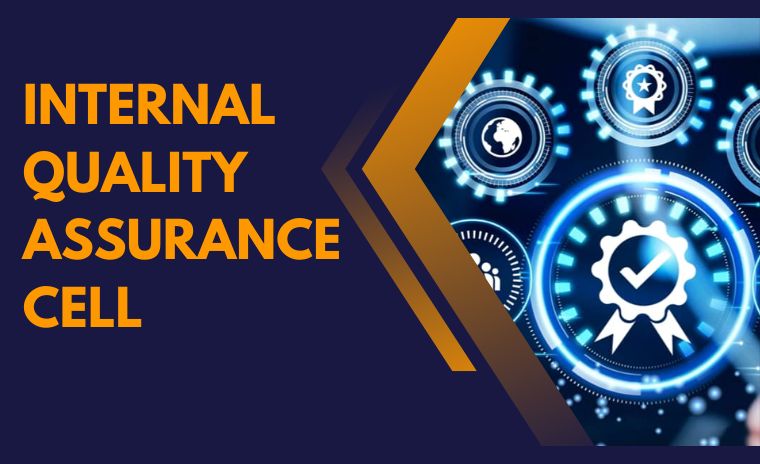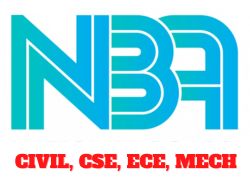
Internal quality assurance cell (IQAC) has been constituted in our college on 14.08.2015 in order to implement and monitor the various aspects of quality improvement both in academic and administration.
Date and Year of NAAC Accreditation: 20 to 22, Oct 2016
Institution Status: Approved by AICTE and Affiliated to Anna University Chennai.
|
SL.NO |
Name |
Position |
|
1. |
Mr.K.RAJAGURU |
IQAC - COORDINATOR |
|
COORDINATORS |
||
|
2. |
Dr. S. SUGANTHI |
NAAC & ISO |
|
3. |
Dr. A. RAJKUMAR |
Private Rankings (Nat / Int) |
|
4. |
Dr. B. BALRAJ |
NIRF/PBAS/CAS |
|
5. |
Dr. S. JEYASUDHA |
UGC/Autonomous |
|
6. |
Dr. S. SYED AKBAR |
NPTEL/ICT |
|
7. |
Mr. RAJAVARMAN |
Anna University/AICTE |
|
8. |
Mr. S. DINESH |
NBA |
|
IQAC MEMBERS |
||
|
9. |
Mrs.S. MURUGAVALLI |
AI |
|
10. |
Mrs. R. ESWARI |
CIVIL |
|
11. |
Ms.S.UMA MAGESHWARI |
CSE |
|
12. |
Mr.A.T.SANKARA SUBRAMANIAN |
EEE |
|
13. |
Dr. D. MADANKUMAR |
S&H/PHY |
|
14. |
Mr.C.KALAIVANAN |
S&H/CHY |
|
SL.NO |
Name of the Faculty |
Position |
|
1. |
Dr.N,Vasudevan, Principal |
Chairperson |
|
2. |
Dr.S.Kuppusamy, Executive Director, KRCT |
Management |
|
3. |
Dr.A.Rajkumar, HoD., EEE. |
Faculty |
|
4. |
Dr.S.Suganthi |
Faculty |
|
5. |
Dr.V.Vijayan |
Faculty |
|
6. |
Mr.V.Chandrasekar, AO.,KRGI. |
Senior administrative officer |
|
7. |
A.N.SARA.,B.E.,M.B.A.,Executive Engineer, Water Resources Dept, Special Project division, Kulithalai. KarurDist |
Industrialists |
|
8. |
Ibrahim , Skyline builders, Theni |
Alumni cum employer |
|
9. |
Dr.J.Jerald,AssociateProfessor,Department of Production Engineering, National Institute of Technology,Tiruchirapalli |
Academician |
|
10. |
Mr.K.Rajaguru |
IQAC – HEAD |
| Sl. No. | Bench Marks | Process/Mechanism | Outcome |
| 1 | Communication of Vision, Mission andobjectives of the institution admission procedures | Prospectus, News paper,Banner, Notice Board | Have knowledge of facilities and courses offered |
| 2 | Activities consistent with institutional goals | Cells, Committees and Units | Facilitate achieving the institutional goals |
| 3 | Feed back | Oral and formats | About curriculum, facilities and teacher appraisal |
| 4 | Academic Flexibility | Introduce add on courses | Enhance students skills |
| 5 | Innovative teaching and learning | Using different methodof teaching and learning | Applying teachnology in learning |
| 6 | Student assessment | Test, assignments,attendance, preparation exams | Improve academic performance of students, University rank and Meritorious awards |
| 7 | Support services | Publicity of scholarship schemes | Help students get financial assistance and continue higher education |
| 8 | Professional bodies | Membership | Sponsorship for organizing activities, concession for attending seminars and conferences |
The primary role and scope of the above committee will be to validate all institutional level documents before roll out or submission, Introduction and effective implementation of all processes, measurement, analysis, Continuous quality improvement and submission of reports. Broad core Activities of the above members are listed as follows.
PROGRAM OUTCOMES:
Engineering Graduates will be able to:
PO1 Engineering knowledge: Apply the knowledge of mathematics, science, engineering fundamentals and an engineering specialization to the solution of complex engineering problems.
PO2 Problem analysis: Identify, formulate, review research literature and analyze complex engineering problems reaching substantiated conclusions using first principles of mathematics, natural sciences and engineering sciences.
PO3 Design/development of solutions: Design solutions for complex engineering problems and design system components or processes that meet the specified needs with appropriate consideration for the public health & safety and the cultural, societal and environmental considerations.
PO4 Conduct investigations of complex problems: Use research-based knowledge and research methods including design of experiments, analysis & interpretation of data and synthesis of the information to provide valid conclusions.
PO5 Modern tool usage: Create, select and apply appropriate techniques, resources and modern engineering & IT tools including prediction and modeling to complex engineering activities with an understanding of the limitations.
PO6 The engineer and society: Apply reasoning informed by the contextual knowledge to assess societal, health, safety, legal & cultural issues and the consequent responsibilities relevant to the professional engineering practice.
PO7 Environment and sustainability: Understand the impact of the professional engineering solutions in societal and environmental contexts, and demonstrate the knowledge of and need for sustainable development.
PO8 Ethics: Apply ethical principles and commit to professional ethics and responsibilities and norms of the engineering practice.
PO9 Individual and team work: Function effectively as an individual and as a member or leader in diverse teams and in multidisciplinary settings.
PO10 Communication: Communicate effectively on complex engineering activities with the engineering community and with society at large, such as, being able to comprehend and write effective reports and design documentation, make effective presentations and give and receive clear instructions.
PO11 Project management and finance: Demonstrate knowledge and understanding of the engineering and management principles and apply these to one‘s own work as a member and leader in a team to manage projects and in multidisciplinary environments.
PO12 Life-long learning: Recognize the need for and have the preparation and ability to engage in independent and life-long learning in the broadest context of technological change.
Department of Civil Engineering
About Department
The Department of Civil Engineering was established in 2010 under affiliation of ANNA UNIVERSITY Chennai. Currently the department offers a 4years graduate programme (B.E.) in Civil Engineering. The department has well established laboratories with R&D It has well Qualified, committed and motivated faculties team continuously motivates the students to be recognized as in international Leader in engineering arena, research and the application of knowledge to uplift the society. The Department faculties and students are also powered by the ISTE, IRDE, and IAENG Professional Societies. The department follows enhanced teaching aids like OHP, LCD projection and E-learning which help the students visualize the concepts clearly in an easy and understandable manner.
Courses Offered
B.E. - Civil Engineering - 4 Years
VISION OF THE DEPARTMENT:
To create an environment that shall foster the growth of intellectually capable and innovative professionals who can contribute to the growth of technology in partnership with industry and develop and harness it for the welfare of the Nation and Mankind.
MISSION OF DEPARTMENT:
M1: To promote process automation so has to casted to the needs of the industry.
M2: To provide instruction to students in engineering practices for sustainable development.
M3: To groom the students be a part of active contributors in infra-structure, environment and transportation fields in the country.
PROGRAM EDUCATIONAL OBJECTIVES:
Our graduates shall have
PEO1 To prepare students for successful careers in Civil Engineering field that meets the needs of Indian and multinational companies.
PEO2 To enhance process automation capability among students and there by apply it in real world problems.
PEO3 To develop students to use modern techniques, skill and software tools for solving problems in Civil Engineering.
PEO4 To provide students with a sound foundation in thrust areas such as Infrastructure, Environment and transportation fields of civil engineering.
PROGRAM SPECIFIC OUTCOMES (PSOs)
PSO1 Solve problems in the structural, construction management, hydraulics, geotechnical, transportation and environmental disciplines of Civil Engineering
PSO2 Design and Adapt state-of-the-art practices in civil engineering structures using relevant codes of practice, materials, techniques and software
Department of Computer Science and Engineering
About Department
The Department of Computer Science and Engineering was established in the year 2010 with key motif of success to the students in achieving their goal. The Department has well-equipped Laboratories and Research Laboratories with licensed software’s and also the faculties motivate and encourage their students in upgrading their skills through, motivating students to take active participation in Hackathons, Industrial Visits and In-plant training Programmes. The Department follows enhanced teaching aids like OHP, LCD , Smart Board projectors and e-Learning which help the students to visualize the concepts clearly in an easily and understandable manner.
Courses Offered
B.E. – Computer Science and Engineering - 4 Years
M.E. - Computer Science and Engineering - 2 Years
Ph.D. Information and Communication Engineering (CSE) –Part-Time/Full Time
VISION OF DEPARTMENT:
To be a center of eminence in creating competent software professionals with research and innovative skills.
MISSION OF DEPARTMENT:
We will strive
M1: Industry Specific: To nurture students in working with various hardware and software platforms
inclined with the best practices of industry.
M2: Research: To prepare students for research oriented activities.
M3: Society: To empower students with the required skills to solve complex technological problems of
society.
PROGRAM EDUCATIONAL OBJECTIVES:
PEO1: Domain Knowledge:
To produce graduates who have strong foundation of knowledge and skills in the field of Computer Science and Engineering.
PEO2: Employability Skills and Research:
To produce graduates who are employable in industries/public sector/research organizations or work as an entrepreneur.
PEO3: Ethics and Values:
To develop leadership skills and ethically collaborate with society to tackle real-world challenges.
PROGRAM SPECIFIC OUTCOMES (PSOs)
PSO1: Domain Knowledge: To analyze, design and develop computing solutions by applying foundational concepts of Computer Science and Engineering.
PSO 2: Quality Software: To apply software engineering principles and practices for developing quality software for scientific and business applications.
PSO 3: Innovative Ideas: To adapt to emerging Information and Communication Technologies (ICT) to Innovate ideas and solutions to existing/novel problem
Department of Electronics & Communication Engineering (NBA Accredited)
About Department
The Department of Electronics and Communication Engineering was established in the year 2010 with key motif of success to the students in achieving their goal. The Department has well- equipped Laboratories and Research Laboratories with licensed software’s and also the faculties motivate and encourage their students in upgrading their skills through, motivating students to take active participation in Hackathons, Industrial Visits and In-plant training Programmes. The Department follows enhanced teaching aids like OHP, LCD , Smart Board projectors and e-Learning which help the students to visualize the concepts clearly in an easily and understandable manner.
Courses Offered
B.E. - Electronics and Communication Engineering - 4 Years
M.E. - VLSI Design - 2 Years
Ph.D. Information and Communication Engineering (ECE) –Part-Time/Full Time
VISION OF DEPARTMENT:
To create innovative and socially responsible Electronics and Communication Engineers with design skills and research focus to meet Societal and Industrial needs.
MISSION OF DEPARTMENT:
M1: To provide high quality education and professional ethics to students through enhanced learning environment
M2: To impart a creative environment towards centre of excellence in department with design skill and exposure for research.
M3: To nurture required employable skills of students to satisfy the industry and social needs with ethical and human values.
PROGRAM EDUCATIONAL OBJECTIVES:
PEO1 Strong base in Mathematics, Science, Electronics, Communication and inter disciplinary engineering to face the challenges of real world engineering problems in society and industry by creative, design, development and critical reasoning skills.
PEO2 Amenability to new technologies and attain professional competence through lifelong learning such as advanced degrees, professional registration, publications and other professional activities.
PEO3 Competency to collaborate as a team member and as team leader to address social, technical and engineering challenges ethically.
PROGRAM SPECIFIC OUTCOMES (PSOs)
PSO1 To analyze, design and develop solutions by applying foundational concepts of electronics and communication engineering.
PSO2 To apply design principles and best practices for developing quality products for scientific and business applications.
PSO3 To adapt to emerging information and communication technologies (ICT) to innovate ideas and solutions to existing/novel problems.
Department of Electrical & Electronics Engineering
About Department
The Department of Electrical and Electronics Engineering was established in the year 2010 with key motif of success to the students in achieving their goal. The Department has well-equipped Laboratories and Research Laboratories with licensed software’s and also the faculties motivate and encourage their students in upgrading their skills through, motivating students to take active participation in Hackathons, Industrial Visits and In-plant training Programmes. The Department follows enhanced teaching aids like OHP, LCD , Smart Board projectors and e-Learning which help the students to visualize the concepts clearly in an easily and understandable manner.
Courses Offered
B.E. - Electrical and Electronics Engineering - 4 Years
M.E. -Power Electronics and drives - 2 Years
M.E. –Embedded Systems - 2 Years
VISION OF DEPARTMENT:
To develop globally competent Electrical Engineers with excel in education and research thereby contribute value to the society
MISSION OF DEPARTMENT:
M1: To recommend quality education in Electrical and Electronics Engineering and prepare the students for career development and higher studies.
M2: To support excellence in research activities through Research lab and promotional activities with industries.
M3: To built moral and ethical values along with the academics to serve the society
PROGRAM EDUCATIONAL OBJECTIVES:
PEO1: To keep abreast of new developments by applying knowledge on the theory and practices in the field of electrical power engineering.
PEO2: To adapt and apply relevant techniques, resources and emerging Engineering and IT tools for developing quality products in scientific and business applications.
PEO3: To apply the knowledge acquired from research and research methods including design of experiments, analysis and interpretation of data and synthesis of information for arriving significant conclusion
PROGRAM SPECIFIC OUTCOMES (PSOs)
DEPARTMENT OF MECHANICAL ENGINEERING (NBA Accredited)
About Department
The first-degree course in Mechanical Engineering was started in June, 2010. Moving through a few years, the Department of Mechanical Engineering consolidated to its present condition offering 8-Semester Undergraduate Courses with an approximate intake of 140 students annually. The Department provides ample laboratory facilities and hands-on training to the Undergraduate students both in the conventional subject and in the emerging fields of specialization. The department has obtained research grants from various funding agencies, organized National Conferences, Conducted Guest Lectures, Seminars, and Workshop. The department has Research and Development Center (3D printing laboratory, PTC, Welding Research laboratory and an exclusive lab for Automobile Engineering.) and Center of Excellence with Industry. The department has signed MOU with PTC to enrich skills in design aspects and offers special language courses (Japanese etc.). The department has received funds from research funding agencies such as CSIR, ICMR, TNSCST etc. The department shows great progress in research through publication of handsome number of patents and papers in international journals. Our team of faculties along with the support of the principal and our Chairman Dr.K.Ramakrishnan successfully conducted two multidisciplinary International Conference iConnect 2K17, iConnect 2K18 and ICONEEA 2K19 in a grand manner by publishing the papers in reputed journal such as Journal of Applied Fluid Mechanics (Thomson Reuters Indexed), Journal of Surface Science and Technology, Materials today proceedings (Scopus Indexed) and Journal of New Materials for Electrochemical Systems (Annexure I and Scopus Indexed).
Courses Offered
B.E. – MECHANICAL ENGINEERING
VISION OF DEPARTMENT:
To produce effective, quality and responsible mechanical engineering graduates.
MISSION OF DEPARTMENT:
M1: To Provide broad education in mechanical engineering with analytical and research abilities, encouraging culture of endless learning and by adopting new technologies to solve the industrial need and social issues.
M2: Provide state-of-art infrastructure and learning resources with well experienced faculty members.
M3: To share knowledge with our students through educational programs and all of society through disseminating our research findings in scholarly publications, presentations, patents, entrepreneurship and technology transfer.
PROGRAM EDUCATIONAL OBJECTIVES:
PEO1: Applying knowledge of mathematics, science, and engineering in core field of Mechanical Engineering.
PEO2: Have technical knowledge in specialized areas of Mechanical Engineering such as Materials, Design, Manufacturing and Thermal Engineering with a focus on research and innovation and gaining the technical skills in classical software packages.
PEO3: Have Ethical and techno-savvy leadership along with socio-economic management skills resulting in a successful professional career or higher studies or research.
PROGRAM SPECIFIC OUTCOMES (PSOs)
PSO 1: An ability to understand and apply the fundamental and advanced concepts in mechanical engineering in various domains, like materials, design, manufacturing and thermal engineering etc., in the design, development and implementation of complex products and systems.
PSO 2: To adopt towards emerging software information and communication technologies in mechanical engineering to innovate ideas and solutions to societal problems.
PSO 1: An ability to understand and apply the fundamental and advanced concepts in mechanical engineering in various domains, like materials, design, manufacturing and thermal engineering etc., in the design, development and implementation of complex products and systems.
© Copyright KRCT | All Rights Reserved.




